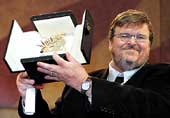 |
| Moore: Little love lost |
Cannes, May 23 (Reuters): The Cannes film festival has given Michael Moore the perfect platform to harangue President George W. Bush after award- ing the controversial US filmmaker one of world cinema’s top prizes.
Moore, eager to stir the apathetic into voting in November’s US presidential elections, landed the best film award for Fahrenheit 9/11, a blistering indictment of Bush’s handling of Iraq and the war on terror.
“Perhaps this film will have a tremendous impact. I hope it will,” said Moore who said he would be shocked if the documentary did not find a US distributor after being awarded the Palme d’Or.
The Walt Disney company had ordered its Miramax unit not to distribute the politi- cally polarising documentary in an election year.
Asked how Bush would react to Moore winning such a prestigious award, Moore said: “Would he even know what this is?”
“I hope nobody tells him that I have won this award while he is eating a pretzel,” he said in reference to the occasion Bush choked on a pretzel and fainted while watching an American football game on television.
Moore won an Oscar two years ago for his anti-gun lobby documentary Bowling for Columbine and electrified the awards ceremony with an emotion-charged attack on Bush.
Cannes offered another perfect platform before the world’s media when he said: “I want to ensure that those who died in Iraq have not died in vain.”
Moore also took the chance to apologise to France for US jibes about renaming French Fries “Freedom Fries” and calling them “Cheese-eating surrender monkeys” for opposing the war in Iraq.
“The French are our friends,” Moore said. “Without the French there might not have been a United States of America. The French helped us in our revolution.
“The statue that graces our harbour in New York city was a gift from the French people to celebrate our liberty.”
Moore said his prime aim had been to make a movie that people would enjoy on a Saturday night out. The jury president, cult film director Quentin Tarantino, said the prize was not political.
But the critics disagreed, arguing this was a heartfelt attack on the Bush administration designed to stir disillusioned Americans into voting in November.
The film certainly packed an emotional punch, switching from shots of American soldiers abusing Iraqi prisoners to a grieving mother reading out the last letter she received from her soldier son in Iraq.
Moore’s loathing of Bush is palpable in every shot. The President is painted as a politically incompetent buffoon.
The influential trade paper Variety called the deftly edited movie “a blatant cinematic 2004 campaign pamphlet” and the Hollywood Reporter agreed, dubbing it “an election year device”.
Cannes, scorned by art-house movie buffs as a crass marketplace for cigar-chomping moguls to clinch deals on shiny yachts, has turned political with a vengeance this year and Moore hailed the way this mirrored troubled times.
“Non-fiction is taking itself out of its own ghetto,” he said after his documentary landed the prize which has in the past been awarded to some of the world’s greatest filmmakers.










